Having trouble starting up your plants from seeds? Well, don’t let anyone fool you into buying a truck full of seedlings when you could have easily achieved more with a small bag of beans. More often than not, greenhorn gardeners and homeowners are outright scared of using seeds to grow anything.
And admittedly so; germinating strong, healthy plants from grains can be a daunting prospect. But as you’ll soon find out, there’s never anything wrong with the seeds – the problem usually involves where and how you plant them.
Any serious gardener will tell you that you simply don’t break rule numero uno of the planting season; thou shalt not planteth delicate seeds in regular compost! The only way to create optimum growing conditions for seedlings through and through is to use specialist compost.
The best seed compost improves all aspects in the germination process including drainage, aeration, pH, and nutrition to help even the fussiest perennials and shrubs to sprout.
Key Features to Look for When Buying Seed Compost
i. Organic
As explained above, seeds are incredibly delicate. It doesn’t take a lot to kill them or disrupt the germination process. As such, using some harsher types of fertilizer can be detrimental to the process. Organic seed compost is recommended because of its milder, natural effect on the seeds.
ii. Fine Particle Size
The last thing a sprouting seed needs is a ton of weight to overcome before bursting out of the soil surface. That’s why the best seed compost has super fine particles that are not only lightweight, but also easier to absorb. The size also helps with drainage and aeration for faster growth.
iii. Lower Nutrient Levels
While germinating, seedlings really only need minimal amounts of nutrients. So unlike grown plants which require fertilisers heavy in nutrients, great seed compost could even have intentionally lowered nutrient levels for a more natural growth cycle.
The Best Seed Compost Reviews
1. Klasmann Organic Seed Compost
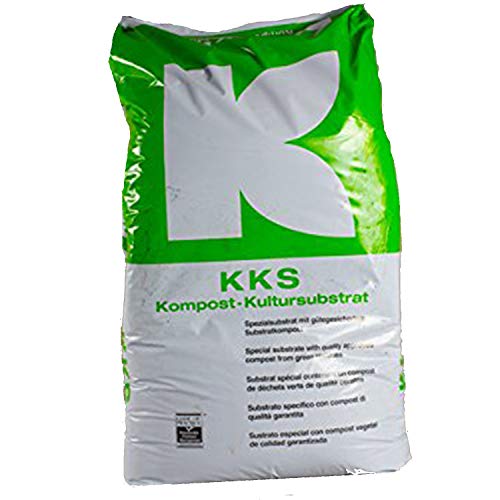
Got a large nursery that’s about to become home to hundreds of seeds? Or maybe you just want to stock up on compost for future planting seasons. Either way, you’ll need Klasmann’s big, healthy bag of organic compost. This hefty bag contains 70 litres of compost with just the right nutrients for the very early stages of plant life.
For the price range, Klasmann made some incredibly high quality compost. For starters, you don’t get those large, wood chunks and bits that cheaper organic composts usually have. The particles are extra fine making them suitable for use with smaller seeds. Klasmann is also one of the few brands that actually lower the nutrient levels of their seed compost on purpose – this improves germination without an unnecessary flood of excess nutrients.
What I like about it:
- Big bag of compost (70L)
- Great value for money
- Intentionally lowered nutrients for consistent healthy growth
2. Westland Gro Sure Seed and Cutting Compost
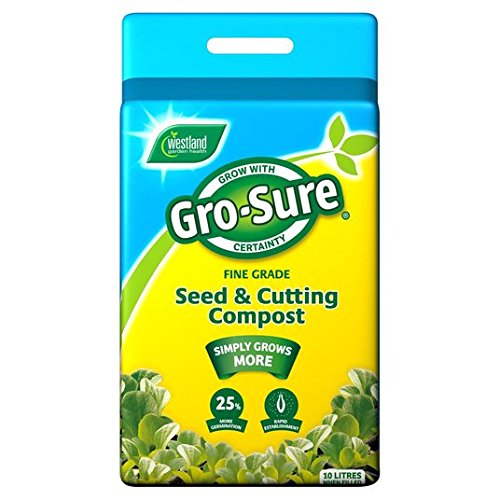
If there’s one thing that’s harder to grow than seeds, it’s got to be fresh cuttings. Seeds were made to sprout roots; cuttings on the other hand have to literally grow roots from nowhere. That’s why gardeners have been giving plenty of credit to Gro Sure seed and cutting compost from Westland.
The compost comes in a 10L pack of super fine compost weighing in at only 3.71Kg. It contains seaweed and other nutrients that plants need for proper growth. Not only is this compost suitable for planting cuttings, but also excells with new seeds as well. Westland claims that using it could improve seed germination by as much as 25%. A great way to get a headstart in the planting season.
What I like about it:
- Ideal for both seeds and cuttings
- Boost growth by 25%
- Incorporates seaweed among other nutrients
3. Levington John Innes Seed Mix
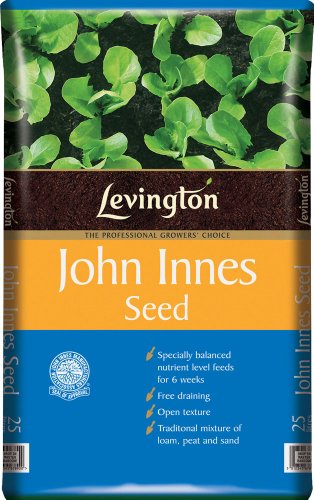
The 25L bag of compost from Levington John Innes has been branded as the professional gardener’s choice – and for good reason. Straight off the bat, you’ll notice that they’re not too shy about the fact that their compost contains higher nutrient levels. This might be unnecessary for some types of seeds, but it’s a major advantage for professionals who know when and how to use it.
See, once your seeds have germinated by using just a bit of John Innes, you can use the rest for final potting or transplanting or the seedlings – that’s where the higher nutrient levels come in handy. The compost keeps in line with the traditional mixture of peat, grit, and loam to create a great open texture, free draining compost.
What I like about it:
- Traditional mix of grit, loam and peat
- Contains higher nutrient levels than regular seed compost
- Great texture offers optimum aeration and drainage
4. Miracle-Gro Expand-n-Gro Enriched Compost
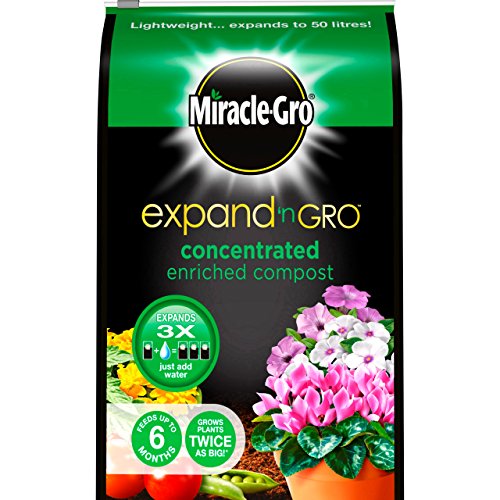
The Expand-n-Gro Enriched Compost from Miracle-Gro is the literal definition of great things coming in small packages. The small 4.8 Kg bag is light to carry and store; but the best part is that the compost expands three times when watered to make 50 Litres. What’s more, it actually holds on to over 50% of this water releasing it slowly as required by plants.
In addition to less watering requirements, the Expand and Gro compost makes your garden soil 40% lighter. This means more air can make it to the roots allowing for faster nutrient absorption. The compost is made from recycled natural fibres and enriched with Miracle-Gro plant food that feeds your nursery for up to 6 months. Mix is ideal for use in borders, seed beds, gardens, hanging baskets and pots with a drain hole.
What I like about it:
- Expands to 50L when water is added
- Absorbs water and releases is slowly
- Long lasting nutrient action (6 months)
5. Greenbrokers Organic All Purpose Compost
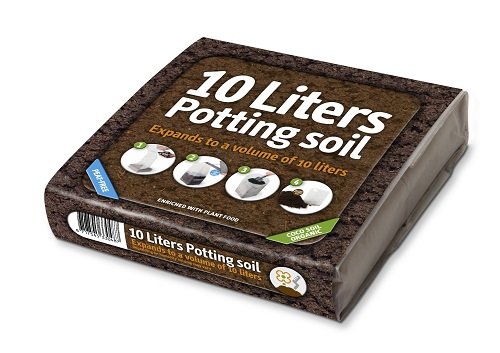
Looking to spruce up your home with a few potted plants and flowers? Well, the last thing you need is a big, heavy bag of compost. Greenbrokers limited gives you a small, light and neat 600g pack of all purpose organic compost. But don’t be fooled by the small size; the compost expands to 10L once watered.
This convenient small pack is ideal for both indoor and outdoor use. Just a few of these are enough to fill your home with lively potted plants. Greenbrokers ltd. incorporated plenty of micronutrients that boost plant development. This entails an NPK fertilizer blend of 20-20-20. The potting soil also has good water holding capacity so you don’t have to keep watering regularly.
What I like about it:
- Small light and convenient mess free pack
- Expands to 10L when watered
- Enriched with nutrients required for plant growth
Frequently Asked Questions
Q: How to make your own seed compost?
Good compost needs to be a 50:50 mixture of materials that contain carbon and nitrogen, and seed compost needs to have things added to it that makes it light enough for smaller seedlings to poke their heads through.
You can easily make your own seed compost if you have a compost heap or bin, and access to leaf mould and some sand to aerate the mixture.
- Take your well rotted leaf mould, and add a small amount of sieved compost from your supply.
- Mix in the same amount of horticultural sand, and stir the mixture well to ensure there are no lumps or large clumps.
- Moisten the mixture before you start to use it, and ensure that you put enough in the pots for the plants to grow into.
It is surprisingly easy to make your own seed compost, but many people prefer to use a shop bought version as you can be sure it contains all the right nutrients for your precious seedlings.
That being said, it can save you money to make your own, and you might just stumble across the best formula you’ve ever discovered for making your plants grow the best they possibly can!
Q: Why use seed compost?
Seed compost is typically finer than standard compost, meaning your seeds don’t have to struggle so hard to get through the soil.
It is also easier to plant out the seeds that have been grown in seed compost, as standard compost is heavier and can cling to the roots and even break them.
Q: How long does seed compost last?
An unopened bag of seed compost should last indefinitely. If it is opened, even if it has been relatively well covered, it will not last as long, and you may find that it has gone dry and stale by the time you come to use it.
If seed compost is allowed to get wet, any nutrients in it will start to break down and it will be no good after about 6 months or even less.
Keep it unopened and use it all at once if you can, but if it is opened then just keep it well covered and as dry as possible.
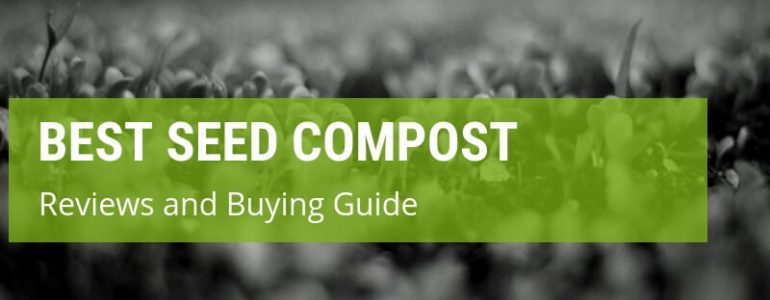







Thank you Jack but where can I buy KKS seed compost
Thank you for the advise, I have passed it on to Family and Friends.
Sorry, but I found lumps of bark and other chunks of coarse, clay/sand in my 2 bags of Levington John Innes seed compost. I had to sieve both through a garden sieve to get the lumps out. Might be OK for seed potatoes, but not for anything small.